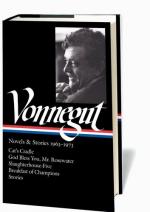|
This section contains 564 words (approx. 2 pages at 300 words per page) |

|
Vonnegut expresses a relentessly pessimistic vision of man, a pessimism far surpassing the cynic's belief in the eventual victory of evil or the fundamentalist's version of a fall from grace. For there can be no victory without a battle and no fall if one from the start is inescapably mired at the bottom of the pit. The moral drama between right and wrong loses all meaning if men are not free to choose and competent to act, and Vonnegut sees man as neither competent nor free. In his fictional world, there are no villains and, as well, no heroes to oppose them; both good and evil are beyond man's grasp. When he writes in the introduction to Slaughterhouse-Five that he learned in college "there was absolutely no difference between anybody," the ironic tone does not belie the accuracy of the words. Vonnegut does believe that all men are...
|
This section contains 564 words (approx. 2 pages at 300 words per page) |

|


